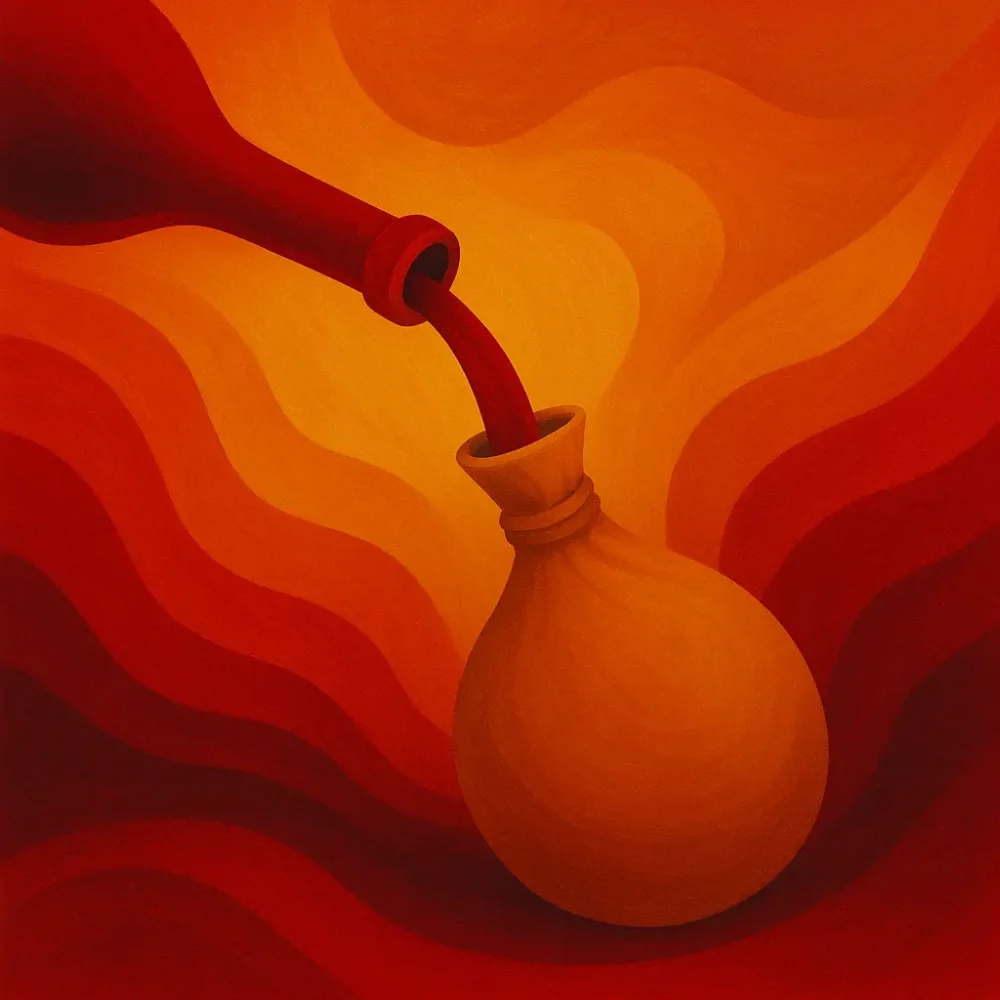One of Jesus’s most profound and (maybe surprisingly) deep metaphors was you “can’t put new wine into old wineskins”. This phrase appears in the Gospels of Matthew, Mark, and Luke, where Jesus uses it to answer a provocative question about religious practices from the Pharisees.
So what is new wine and why can’t it go into old wineskins?
Lets explore the meaning of this biblical metaphor, what Jesus meant by this saying, and how it applies to our lives today. By the end, you’ll understand why Jesus said you “can’t put new wine into old wineskins” and you’ll be encouraged to reflect on what new wine God might be pouring into your life today.
Where Does the Bible Talk About New Wine in Old Wineskins?
The saying comes directly from Jesus. It is recorded in three of the Gospels: Matthew, Mark, and Luke.
In each case, Jesus is responding to a question about why his disciples weren’t following the typical religious custom of fasting.
You Wouldn’t Fast at a Wedding
Jesus first compares himself to a bridegroom at a wedding – suggesting that his presence is a time of joy (when one would feast, not fast).
Luke sets the scene like this:
“Some people said to Jesus, ‘John’s disciples often fast and pray, and so do the disciples of the Pharisees, but yours go on eating and drinking.’ Jesus answered, ‘Can you make the friends of the bridegroom fast while he is with them?’” (Luke 5:33–35)
Luke 5:33–35
Old Practices in a New Situation
He then gives two analogies to explain why forcing old practices on a new situation would be inappropriate.
“No one tears a piece out of a new garment to patch an old one. Otherwise, they will have torn the new garment, and the patch from the new will not match the old.” (Luke 5:36)
Luke 5:36
“And no one pours new wine into old wineskins. Otherwise, the wine will burst the skins, and both the wine and the wineskins will be ruined. No, they pour new wine into new wineskins.” (Mark 2:22)
Mark 2:22
Resistance to Change
Matthew’s Gospel records it similarly but Luke’s account adds an extra bit of detail:
“And no one after drinking old wine wants the new, for they say, ‘The old is better.’” (Luke 5:39).
Luke 5:39
That additional comment recognizes how people can be resistant to change, preferring the familiar “old wine” over the new.
So, the context of this metaphor is a discussion about religious traditions (like fasting) in light of Jesus’ arrival. He’s indicating that something new is happening with his coming – so new, in fact, that it can’t be simply fitted into the old religious regulations and restrictions.
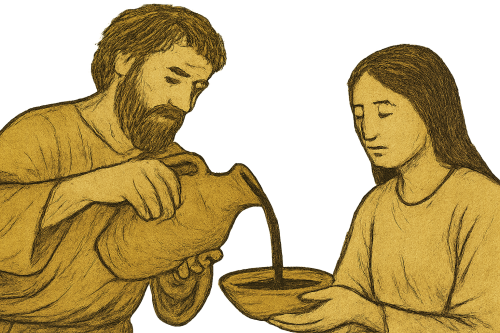
What Is New Wine in the Bible?
In the literal sense, in biblical times, “new wine” referred to freshly pressed grape juice that was in the process of fermenting. Unlike aged wine, new wine was still bubbling and expanding as it fermented. In the broader biblical context, “new wine” can simply mean fresh wine – often a symbol of blessing and abundance.
Existing Symbolism of New Wine in the Bible
Gods Favour and Provision
For example, in the Old Testament, having plenty of “grain, oil, and new wine” was a sign of God’s favour and provision
The LORD replied to them: “I am sending you grain, new wine and olive oil, enough to satisfy you fully” (Joel 2:19)
Joel 2:19
“then your barns will be filled to overflowing, and your vats will brim over with new wine” (Proverbs 3:10)
Proverbs 3:10
Joy and Celebration – Harvest Festival and The New Season
In ancient Israel, new wine wasn’t just a beverage — it marked the beginning of a new season of joy and provision. It was closely tied to the harvest festivals, particularly Pentecost and Tabernacles, where people brought the first fruits of their crops, including wine, as an offering of thanksgiving to God.
And wine that maketh glad the heart of man (Psalm 104:15)
Psalm 104:15
New wine represented fresh blessing and the joy of God’s provision. It was a sign that the dry season had ended, and a time of abundance had arrived.
When Jesus uses the image of new wine, He taps into this rich tradition. He’s announcing the arrival of a new spiritual season — full of joy, transformation, and divine presence. Like the first taste of harvest wine, His message brings life and celebration, signalling that something new has begun in God’s relationship with His people.
This is another reason why wine is so appropriate in this metaphor- the coming of Jesus and the new covenant is a time for celebration and joy.
What Jesus Means by New Wine
When Jesus speaks of “new wine” in this metaphor, he’s using it figuratively. So what does the new wine symbolize? Jesus doesn’t explicitly define it in the text, but based on the context and how biblical scholars interpret it, new wine represents the new reality of Jesus’ own teaching, ministry, and the New Covenant he was bringing. In other words, new wine stands for the fresh work of God’s Kingdom unfolding in Jesus’ life and message.
You could even think of new wine as the gospel itself – the “good news” of the Kingdom of God. Jesus was introducing something very new: forgiveness of sins, reaching out to sinners and Gentiles, bringing the global availability of Holy Spirit, and establishing a new way for people to relate to God (through faith in Him rather than through the old sacrificial system).
Jesus is essentially bringing the long-promised “new covenant” into reality. This “new wine” includes Jesus’ teachings about grace and truth, the new commandment to love as he loves, and ultimately the outpouring of the Holy Spirit after his resurrection.
What Are Old Wineskins in The Bible?
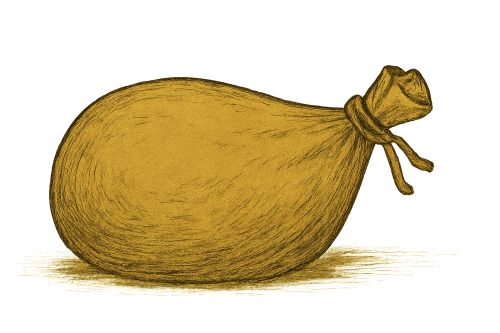
What is a Wineskin?
In biblical times, a wineskin was a common container for liquids, made from animal skin (often goat hide). People would clean and sew the skins to form a bag that could hold wine (or water). The inside might be treated with resin or pitch to make it waterproof. When new wine (fresh grape juice) was put into a new wineskin, the fermentation process would produce gases, causing the wineskin to stretch. New wineskins were flexible – the leather could expand without breaking. But after a wineskin had been used repeatedly and the wine inside had aged, the leather would become dried out and lose its elasticity. An old wineskin was hard and brittle, no longer able to stretch much.
If you pour new, still-fermenting wine into an old wineskin, as the wine releases gases and tries to expand, the rigid skin cannot stretch to accommodate it. The inevitable result is that the old wineskin bursts, and you lose both the wine and the skin.
In contrast, a fresh wineskin can stretch with the fermenting wine and preserve both.
What Jesus Means by Old Wineskin
Jesus’ listeners would have been very familiar with this everyday knowledge. The literal meaning of the analogy is clear – don’t mix new wine with an old, inflexible container. But of course, Jesus wasn’t just giving a lesson in home economics; he was illustrating a spiritual truth.
In the metaphor, the old wineskins stand for old forms or frameworks that are too rigid to accept something new. To the original audience (the Pharisees and disciples of John questioning Jesus), the old wineskins would represent the old religious system – particularly the traditions of Pharisaic Judaism and the old covenant rituals.
It’s important to note Jesus wasn’t saying the Old Testament law was bad wine; rather, he was saying the current “containers” (wineskins) of religious practice (like the extra traditions and expectations) could not contain the new wine of the gospel. The religious leaders had certain fixed mindsets and practices (such as strict fasting schedules, ritual observances, etc.) that were not flexible to the joyful, transformative new reality Jesus brought.
We also must not be like old wineskin – closed off and inflexible – but instead to be open to the new life (new wine) Jesus offers.
Symbolism in the Wine Making Process
New, Alive and Active
New wine in this context symbolizes something dynamic, potent, and new that God is doing. It’s alive and active – just as fermenting new wine expands with energy. It carries the idea of new life, new joy, and spiritual vitality that Jesus brings. Just as new wine is delicious but still expanding, Jesus’ message was good but also “on the move,” ready to grow and expand far beyond the old forms.
Pressing of the Grapes
The crushing and pressing of grapes in the winemaking process offer a striking picture of what it cost to bring about the new covenant Jesus came to establish. Just as grapes must be broken to release their potential and become new wine, Jesus Himself was “pressed” in Gethsemane and ultimately crushed on the cross, pouring out His life to make that new covenant possible.
In following Him, we too are invited into a journey of transformation – one that often involves being stretched, refined, and humbled. The new wine of the Spirit, with its power, joy, and intimacy with God, doesn’t flow from ease but often emerges through seasons of surrender, repentance, and difficulty. This isn’t punishment – it’s preparation. Just as Jesus’ suffering led to resurrection and renewal, so our own pressing can produce a deeper capacity to receive and carry the life of the new covenant. In God’s hands, the process of breaking becomes the path to becoming vessels of His new wine.
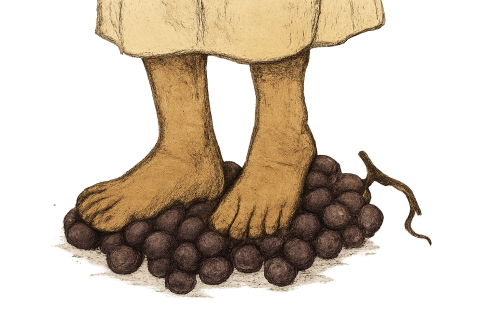
Why Did Jesus Say You Can’t Put New Wine into Old Wineskins?
New Covenant vs. the Old Covenant
Jesus was ushering in the New Covenant through his teachings, death, and resurrection. The Old Covenant (centred on the Mosaic Law (law of Moses), temple sacrifices, etc.) was like an old wineskin. It had served its purpose and was right in its time, but now the “new wine” of salvation by grace through Jesus could not be contained within the old Mosaic system. The Book of Hebrews later explains that the old sacrificial system became obsolete when Christ established the new, because he fulfilled it.
By calling this covenant ‘new,’ he has made the first one obsolete; and what is obsolete and outdated will soon disappear (Hebrews 8:13)
Hebrews 8:13
Jesus didn’t come to patch up the old religion of Judaism or even to build on top of it; he came to transform and fulfil it with something new. This is the new wineskin he speaks of.
Practises Must Fit The New Spiritual Reality
The immediate issue in the context of Jesus’s teaching was fasting. The Pharisees and even John the Baptist’s disciples were fasting according to old customs, often as a sign of penance or longing for God’s deliverance and the coming of the Messiah. Jesus implies that his presence is like a wedding feast – a time for joy and celebration.
It wouldn’t make sense for his disciples to mourn or rigidly fast while the “bridegroom” (Jesus) is with them. That would be as incongruous as putting new wine in an old skin. In other words, the old practice of fasting (an expression of longing for Messiah) didn’t fit the new reality that the Messiah was present bringing celebration.
However after Jesus returned to heaven, his disciples would fast at appropriate times for different reasons:
Jesus states, “But the days will come when the bridegroom is taken away from them, and then they will fast in those days. (Luke 5:35)
Luke 5:35
This teaches us that religious practices must fit the spiritual reality – Jesus was doing a new thing, so clinging to ritual for ritual’s sake was missing the point.
New Message Of Grace Instead of Religion
As just mentioned we can see in the wineskins parable and in the new covenant an important principle about grace and it can not fit into the existing legalistic religion in Israel at the time. The Pharisees had added many traditions and rules (their own interpretations) around God’s law – creating a very rigid system.
Jesus came preaching forgiveness, fellowship with outcasts, and inner purity of heart instead of strictly external rules. That fresh message of grace could not be squeezed into the Pharisees’ framework of earning righteousness by works and maintaining outward purity.
We can see examples later in the new testament of how the message of Grace did not work with the existing rules that were followed before, particularly in Pauls letters. Many people were still trying to find salvation through rules and religious practises.
You who are trying to be justified by the law have been alienated from Christ; you have fallen away from grace. For through the Spirit we eagerly await by faith the righteousness for which we hope. For in Christ Jesus neither circumcision nor uncircumcision has any value. The only thing that counts is faith expressing itself through love. (Galatians 5:4-6)
Jesus’ metaphor warns that you cannot mix the old and new without loss – the gospel of grace can’t be contained in a system of legalism.
Flexibility and Readiness for Change
On a more personal level, Jesus was also addressing the hearts of his listeners. Those who were steeped in the old ways (the religious leaders) found it hard to accept Jesus. It’s like he said
“no one after drinking old wine wants the new, for they say, ‘The old is better.’” (Luke 5:39)
Luke 5:39
The Pharisees were so used to the old wine of their traditions that they didn’t even realize the new wine was better in quality (Jesus’ gospel was the fulfilment of all they hoped for!). Their prejudices made them say “we prefer the old.”
By using this analogy, Jesus highlights how people resist change. He was inviting them (and us) to not be like an old wineskin – closed off and inflexible.
The Old Law was Not The Issue
The fault was not with God’s law, but with the Pharisees’ old and rigid mentality and man-made traditions. They needed to abandon their old interpretations and embrace what Jesus was teaching, or else they would miss out.
Jesus wasn’t condemning everything old. He was instead fulfilling the Old Testament laws. But the structures and rituals that were meant to point to him had to give way to the reality of Jesus. The old wineskin of ceremonial fasting wasn’t needed while Jesus (the reason for rejoicing) was there. Similarly the old covenant sacrifices wouldn’t be needed once his once-for-all sacrifice on the cross has completed.
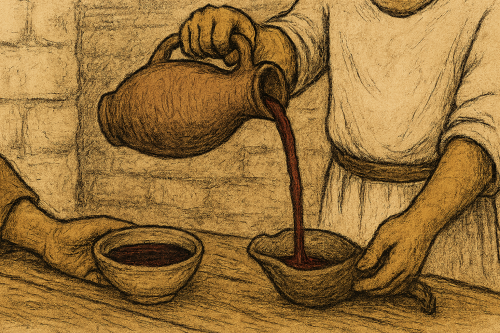
Practical Applications of These Lessons
Embrace the New Life in Christ
When someone becomes a Christian, they receive the “new wine” of salvation and the Holy Spirit. This new life can’t just be added onto our old way of living without change.
We are called to be transformed – essentially to become a new wineskin. The Apostle Paul wrote:
“If anyone is in Christ, he is a new creation; the old has gone, the new has come!” (2 Corinthians 5:17).
2 Corinthians 5:17
In practice, this means we must let go of old sinful habits, old worldviews, and old self-righteous attitudes. We can’t just fit Jesus in to an unchanged life.
Be Open and Flexible to the Holy Spirit
As we grow in faith, God often wants to do new things in our lives – teach us new truths, give us new opportunities for service, or deepen our relationship with Him in surprising ways.
We should cultivate the attitude of a “new wineskin” – flexible, open, and responsive to God’s move. An old wineskin mentality today might look like being stuck in traditionalism or insisting on our comfort zone to the point that we resist when God brings change. For example, perhaps a church has always done things a certain way, and then the Holy Spirit leads them to a new style of worship or a new ministry focus. If members have an old wineskin mindset they might reject a genuine move of God.
Discernment with New vs Old
While being open to new moves of God, we also use discernment. Not everything new is automatically good, and not everything old is automatically bad. Jesus obviously wasn’t against the Old Testament but against empty traditions. In our lives, some “old wine” is actually very good – for instance, the core truths of Scripture and the historic teachings of the faith are precious and shouldn’t be discarded for novelty. Jesus’ teaching doesn’t mean “throw out anything old.” Rather, it means don’t confine God to your old expectations.
Personal Spiritual Growth
With each new lesson or blessing, are you allowing your “wineskin” to expand? Or are you trying to contain God’s work within your old comfort level? Sometimes we ask God for renewal or revival in our lives, but when He begins to stretch us (perhaps through a challenge, a calling to serve, or conviction to change), we feel the strain and resist. The metaphor encourages us to yield to the Holy Spirit’s stretching. It might feel uncomfortable (just as stretching an old wineskin would), but God can also make us new.
Be Vessels of The New Wine
As believers, we are called not to be the source of the new wine, but the vessels that carry it. The treasure we hold – the life, power, and presence of Christ – is not something we produce ourselves, but something He graciously pours into us.
“But we have this treasure in jars of clay to show that this all-surpassing power is from God and not from us.” (2 Corinthians 4:7)
2 Corinthians 4:7
Being a vessel means embracing our weakness and allowing His strength to be revealed through it. The new wine doesn’t originate in us, but it is meant to be poured out through us—into our relationships, our communities, and our worship. Our role is not to create the wine, but to be softened, shaped, and made ready to carry what only Christ can provide.
Conclusion
Jesus’ metaphor of new wine in old wineskins carries a timeless invitation. He is the winemaker of the new covenant, offering the “new wine” of salvation, joy, and communion with God through the Holy Spirit. Each one of us is like a potential wineskin.
The question is, what kind of container will we be for what God wants to do? Will we be pliable and open, or stiff and unyielding?
The good news is that God can transform even the most dried-up “old wineskin” into a new creation. Through repentance and faith, a heart that was once rigid can become soft and receptive. If you feel like you’ve been spiritually stuck or resistant, Jesus extends grace to change you from the inside out. He doesn’t pour out his new wine to destroy you; He wants you to be made new so that His joy and life can fill you without measure.
